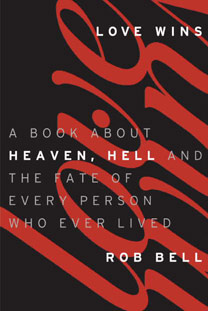BOOK BIN
Love Wins…Despite Rob Bell


Think of this as less of a book review and more of a Public Service Announcement. By request, it’s time I weighed in on the ongoing controversy regarding Rob Bell and his book, “Love Wins”.
This was kind of a reluctant move. A while back I tolerated “A Generous Orthodoxy” by Brian McLaren and I wasn’t sure I was up to another post-modern road trip just yet. But then again, maybe I was assuming the worst of Mr. Bell. Maybe “Love Wins” has been given a bad rap.
So are the accusations true? Is Rob Bell a universalist? The answer to that question is unfortunately a big fat “yes”.
Listening to ( audio book ) Rob Bell walk through the Bible and history was like watching Gozdilla moonwalk through Tokyo, wrecking everything in his path. Getting through this book was a task in itself. Yet not because it was poorly written because the writing style is fantastic and very captivating using stories, history and scripture references to engage the reader. No, rather it’s because the context of those references has been clubbed like a baby seal to promote what I can only describe as universalism…the idea that everyone is or will be saved.
For the greater good I forced myself to listen to the audiobook in order to keep myself from skimming. I counted 8 different occasions where I started screaming “BURN THE HERETIC!” in my car. It was really starting to freak out the other commuters, not to mention the people in my car pool.

But I digress.
It is entirely fitting that Rob Bell begins his book by stating he is tired of the traditional story of Jesus, and embarks on telling us a new one. But its not really new, just another trip down the post-modern road. Yet despite Bell’s repeated references to universal salvation, he still believes in a Hell. Although that sounds like a contradiction, it’s actually not once you get into the book and see what he’s driving at.
The backdoor for Bell is that he does not believe Hell lasts forever. It is a temporary “period of pruning” and “an intense experience of correction” ( page 91). From my young years of growing up a Catholic, that’s sounds a little like purgatory.
Hang on a second, that’s EXACTLY what purgatory is! So there you have it, the perfect transitional faith to go from Catholic to evangelical Christianity. Thank you Rob Bell for your creativity. But whereas the middle ground is often the safe place to be in most situations, our infamous author merely puts us in a theological No-Man’s Land that questions everything, and ignores answers where they have already been clearly given in the Bible.
And that’s the crux of the whole book really: Making assumptions in order to create a faith more palatable and easier to accept. Assumptions that I already mentioned, cannot be demonstrated from scripture.
It also puts the whole global evangelistic effort into an unsettling new perspective. Missionaries by this logic are being imprisoned, beaten, and killed for no other reason that to help people avoid a TEMPORARY house arrest in Hell. Hey, if Shabab-Al Beely is going to slaughter my family and rape my donkeys because I want to share my faith then maybe a little time in Hell is good for him to help burn off all that negative energy. Suddenly trying to save anyone becomes a non-issue because after a little while they’ll come around and be welcomed into heaven with open arms anyway! Think of it as spending a weekend in Winnipeg, Manitoba during a heat wave.

Yes, God is a God of absolute love. But Bell is far more concerned with molding that love to accommodate our easily bruised western sensitivities, rather than accepting the historical biblical narrative that shows a love that is inseparable from its holiness and justice. It’s a common mistake found amongst post-modern Emergent circles that God is love…and ONLY love…with no other attributes.
Despite Bell’s ongoing denial of being a universalist and insistence that Christ’s death is enhanced by his worldview, the opposite is actually true. If we are as the Bible says, “once to die and then judgement” ( Heb 9:27 ) then how does Christ’s atonement enter into play if anyone can accept Christ’s substitution after death? What’s the point of even sharing the gospel? How is that not universalism?
The answer to the salvation question is perhaps even more deplorable than the universalist doctrine Bell upholds. His god has an almost indifferent attitude toward sin. Oh sure, his god doesn’t like it, but he’s now reduced to a permissive parent. Honestly, how can you read Leviticus and ever come to that conclusion? What, too Old Testament-ish a reference for ya? Then how about Revelation? His scripture uses are so utterly indefensible that in many cases, merely reading the next sentence will directly contradict his point! Honestly, twenty years ago the church would laugh at this kind of pop-theology. Why are we now falling for the most basic of heresies?
In spite of the optics or how much if offends some, we Christians readily admit that Jesus is the only way and through Him we are saved from an eternal separation from God. But now…ah ha!!! Jesus is going to get you no matter what you believe! Because what God wants, God gets.
And that is Rob Bell’s logic. In order for God to win, everyone must be saved. So much for the “narrow gate”.
“Love Wins” is really nothing new in terms of theology. It’s just Universalism repackaged for the next generation. This stuff has been around since day one and will continue to be recycled. Mr. Bell is just the latest mouthpiece trying to be God’s new Image Consultant by stripping down orthodox Christianity into nutritionally hollow bite sized chunks that the masses will more readily accept. It’s just regrettable that the outcome is something that is the antithesis of the gospel message.
Footnote:
Kevin DeYoung has accomplished in his review far more than I ever could hope to cover. If this subject interests you, you simply owe it to yourself to check out his 20 page review.



Sean
July 27, 2011 at
The problem with Rob Bell is not just simply what he believes BUT how he gets there.
Here's another review of Rob Bell's book, Love Wins.
http://www.hellsbell.net
Chuck
July 13, 2011 at
Excellent review…and one I sympathize with greatly. Rob Bell has a twisted, distorted and dysfunctional understanding of love, which in turn leads to his twisted, distorted and dysfunctional view of God. I was willing to give him the benefit of the doubt and consider him merely misguided…until I got to Chapter 6 of "Love Wins". Then the mask came all the way off. Rob Bell confesses that if the God of Abraham, Isaac and Jacob judges sinners and metes out justice by sending them to hell…then that is a God that he finds is impossible to love. Indeed, he says that NO Christian can love such a God, because such a God is completely unlovable. In my opinion this blasphemy was the watershed point of the book.
Rob Bell declares that he does not, and cannot, love the God of historic, orthodox Christianity. And he has chosen to create a false god in his own image that fits his warped conceptions of love, man, the world, and salvation. For Bell, love–at least his view of love–wins at the expense of biblical truth.
Keep up the great work, man.
KJC
November 4, 2013 at
Hey, Chuck. If you happen to see this, can you give me page numbers for what you’re referencing in “Love Wins”? I just reread Chapter 6 and couldn’t find anything resembling what you’ve mentioned…is there a chance you’re thinking of another chapter? Take care!
Patricia Zell
May 3, 2011 at
Actually, I had already begun my quest to understand the Bible before Rob Bell was even born. My premise that God's love is absolute has grown over the last 40+ years. As far as postmodern revisionism (whatever that is) vs. historical Biblical context is concerned, do you want to go back to the times when people believed the sun and moon revolved around the earth? The Bible was written in a completely different world than what we live in today. Just a musicians transpose music, we need to let God transpose what was written all those years ago into relevant concepts for our lives today. Another way to look at circumstances is that God is writing the sequel to the Bible through us.
Just for the record, God's absolute love is not permissive. Each and every one of us will go through the baptism of fire, so that He can help us get rid of every iota of deception, loss, death, and destruction that the force of evil has enslaved us with. God wants each of us to know the truth and to be set free. God's love is active (and not passive) and is focused on us having the life that is more abundant than the loss, death, and destruction that is ravaging the world (John 10:10).
Dysfunctional Parrot
May 4, 2011 at
Postmodern revisionism is when you remove something from it's historical context ( ie. predominantly Jewish ) and replace it with modern cultural interpretation ( ie. Western/American ). What you get is often confusing at best and downright incorrectly interpreted at worst.
For example: Biblical festivals, Christ's parables, and especially Paul's writings are terribly misunderstood when their cultural context is ignored. Some might even call it an anti-Jewish bias.
Rob Bell takes cultural context and beats it to death. Much like Bell, you give a verse and go no further. Like John 3:16 for example. Keep reading. The only way you'll get the idea of a temporary hell is if you cherry-pick a verse here and there and remove it from context.
The Bible certainly was written to a different world. So interpret it in light of that. That's good scholarship. The Bible doesn't need the "benefit" of American re-interpretation! Otherwise all you're doing is creating subjective and changing truth. THAT is the essence of postmodernism, and that is why it is dishonest Biblical scholarship.
Patricia Zell
May 3, 2011 at
What if I can provide you with a logical, reasonable, scriptural explanation of why Rob Bell is on the right track concerning the power of God's love. My book, God's Absolute Love: Perfect, Complete, and Real, was released last week. Based on over forty years of sometimes-intensive Bible study in my prayer closet, I share some "new" knowledgeable inferences and concepts that bring new perspective our understanding of just what Christ accomplished on the cross. In other words, I provide the "whys" and the "hows" to Pastor Bell's premises.
Dysfunctional Parrot
May 3, 2011 at
Sure. Why not? Give it your best shot.
Although to be fair, your assumption has a revealing error. You assume that for God's love to be powerful, Rob Bell's conclusions must be true. Presuppositions are not a good foundation for an argument supposedly based in logic.
Your claims of "new" insight also intrigues me. It just seems everyone is trying to come out with a new and improved Christianity 2.0 in order to sell their book or build a following, so you'll have to understand my skepticism. As an avid studier of comparative religions and ancient messianic Judaism, understand that I would interpret your book and test it within the historical Biblical context…not postmodern revisionism.
That's Bell's problem. He can't accept what the Bible says about eternal destinies. He interprets the vague to suit his needs, but ignores the blatantly obvious. His position of a temporary eternal state of separation is indefensible, and he equates love as permissiveness.
That all having been said, I would gladly review your book if you provide me a copy. Contact me via the CONTACT link at the top and we can talk business.
Jack
April 26, 2011 at
"Thank you for reading the book so I don’t have to."
You should never judge a book, let alone an author's theology, based on book reviews written by people who didn't like him anyway.
Also, Mr. Parrot. Leviticus talks about all kinds of things that have no bearing on modern life. Gasp! Heathen! I know. No doubt I'm under the "Hell" column in your book….you know, because Jesus tasked YOU with keeping the Heaven/Hell book. Oh wait, no, he never did that.
Dysfunctional Parrot
April 27, 2011 at
Hold the phone there bub. "Who didn't like him anyway"?? I don't even know Rob Bell!! I just read his book and made a review. All I have to judge him by are his very own words, and that is my God given right to do so. What he has written is clearly not the orthodox historical Christian faith. As for the state of his personal salvation, I have no idea and would never speculate either way. Same with yours.
We as believers are all called to examine and make a call on what is spoken to us. The apostle Paul wasn't above being examined and neither is Bell. Mr. Bell has said as plain as day that hell is a temporary state. Therefore I am well within my rights to call him out on that. And yes, Jesus did talk to me about heaven and hell. In fact, God even arranged having it written down in a little thing called the Bible.
And regarding Leviticus, let's just say I'm somewhat Messianic in my views and leave it at that. Not sure what that has to do with anything anyway.
You might also notice that at the beginning of the article I said I gave Bell the benefit of the doubt. And I did. What I did not give him was a free ride.
However, we agree on one thing: One should always read the book and never take anyone else's word for it. Even mine.
FlyinBrian
April 20, 2011 at
The bigger question is this: how far can you deviate before you are no longer considered Christian? Has Rob Bell crossed that line that goes from heresy to apostasy? That is where the debate lies.
Dysfunctional Parrot
April 20, 2011 at
Now that is indeed the million dollar question right there.
Depending on who you talk to you're going to get different answers. But since this is my one parrot show, I'll give you mine! ( drumroll )
Rob Bell frequently talks about being within the large and wide curtain of the Christian faith. But like many post-modernists he lives right on the edge between orthodoxy and apostasy. For many in our culture that is seen as a "rebel" and someone to be admired. I see it as a fool playing with forces beyond his comprehension.
Scripture is not a toy. It's not something we quote from and then ignore the context to suit our purposes. Yes, to some extent we're all guilty of that…but there's a line in the sand not to be crossed too. Given the scriptural references in "Love Wins", I'm not sure if I can call Rob Bell a heretic, an apostate or just plain lazy.
Anonymous
April 19, 2011 at
Thank you! Thank you for writing this. I don't want to read the book. I am so disturbed by the fact that people are saying this is no big deal. I am bothered by the fact that many people are going to be influenced by this. I am upset by one guy's statement that I read on facebook that there is nothing "faith shattering" in the book. Thank you for explaining what he says. Thank you for reading the book so I don't have to. Sorry you had to expose yourself to that! The whole entire Bible is about redemption and is a picture of Christ. Why would God go to the all that trouble if ultimately we would all be reconciled to Him?